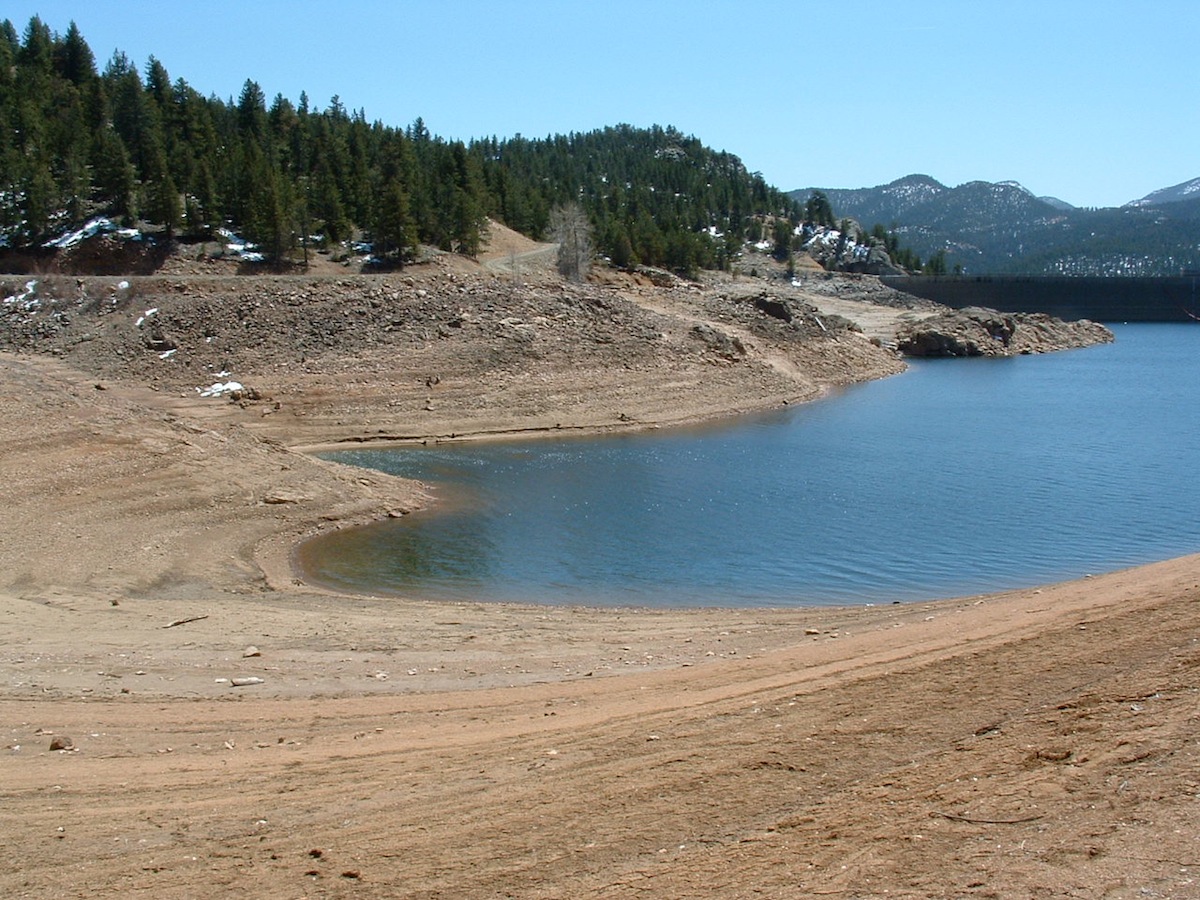The Local newsletter is your free, daily guide to life in Colorado. For locals, by locals.
Look out your front door today, and odds are your lawn is lush and green and your cold-weather crops are sprouting—all without much time spent with the garden hose/sprinkler system, thanks to April’s abundant snowfall and recent rains. But, as always, this low-maintenance scenario won’t last all summer. The difference this year is that Denver Water has declared a Stage 2 drought—a level of warning Colorado hasn’t seen since 2004—which comes with mandatory water conservation measures. We caught up with Stacy Chesney, manager of media and executive communications for Denver Water, to learn more about what the drought means for Denverites and to provide context to the watering restrictions (details below).
5280: How does Denver Water determine what drought stage we are in?
Stacy Chesney: There are a number of different factors and conditions Denver Water staff look at; we present those as recommendations to our board in order to decide where we should be in terms of drought response. In 2012, we were in Stage 1, which is similar to regular watering rules; we let people know we are concerned and ask them to voluntarily reduce use. Because the hot, dry weather stayed, and snowfall was low enough, it warranted a Stage 2 drought for this summer, which puts in place mandatory restrictions with the goal of targeting outdoor use in summer. Weather projections, stream flow data, snowpack, soil moisture, reservoir levels (photo above: Gross Reservoir, 47 percent full on April 28), temperature—these all play a role in what Denver Water asks of its customers.

The last time we were in Stage 2 was the drought of 2002 through the summer of 2004. Prior to April, we were shaping up to be facing the two worst water years in history. You never know; in Colorado we can go from dry to wet pretty quickly. Our job is to balance those cycles and lessen the impact on our customers as much as possible.
5280: Didn’t all the recent precipitation help improve the situation?
SC: The good news is that the snow in April and early May have made a big difference. Increased snowpack is very promising, but it’s still below average peak. The closer we get to the end of runoff, the better we’ll really know how much of that snow will end up in our reservoirs. Our reservoirs haven’t been full since July of 2011; now we’re about 71 percent full, compared to 84 percent, which is the median. We’re hoping that will improve when runoff is over. But we are below where they were in 2002. It’s a range of projections right now; until we have a better sense of where we will end up, we don’t want to be hasty about making decisions.
5280: What is Denver Water doing to incentivize conservation?
SC: We always want customers to be efficient with water use; indoors and outdoors, we have rebates for homes and businesses. Our conservation groups work with all our customers to look at the ways they’re using. Every gallon saved is a gallon that stays in our reservoirs.
In general, I would say that leaks waste water and cost the customer. It can be something you don’t even notice. People should make sure their irrigation systems are tuned up and repair leaks, running toilets in their houses—that way they save money and save water.
5280: How do you discourage water waste?
SC: Every year we have a team of employees that are out to help educate customers about conditions and what they need to do to use water more efficiently. Education is truly the main priority. Our Drought Patrol monitors designated areas of the city, making sure people know the rules and the best ways to use water. [First-time violations receive a written warning; fines and flow restrictors can follow.] Sometimes, people may not notice things happening with their irrigation systems during the day when they are at work, and we can let them know what we saw. We also respond to calls that we get from citizens reporting water waste. In drought and not, there’s the potential to receive fines [for not following annual rules like not watering between 10 a.m. and 6 p.m.], but only after we’ve stopped by for repeated violations. Because of the seriousness of the situation, fines increase during a Stage 2 drought. We hope we don’t need to resort to that measure, but it signifies that during a drought, water waste means that much more.
5280: What is Denver Water doing to get the word out to consumers?
SC: We’re trying to reach as many customers in as many ways as possible: through media stories, speakers, talking to other government officials in Denver and the suburbs. Every customer received a direct mail announcement. We launched a blog so people can keep up-to-date more quickly.
5280: The “Water With Your Meal? Please Ask” signs hanging in just about every restaurant we’ve visted recently caught our attention.
SC: Right! While the water service in particular may not save a ton of water, it makes a huge difference in people’s perception and getting people to think about it. In our advertising, we’ve previously said, “Use Only What You Need.” Now, it’s “Use Even Less.” You’ll see it on billboards. We’ll be out at community events. We’re reaching people wherever they are to make sure that everyone is up-to-date.
DROUGHT STAGE 2: WATERING 101
Between April 1 and September 30:
- Addresses ending in even numbers (0, 2, 4, 6, 8) may water lawns, perennials, shrubs, and trees on Sundays and Thursdays
- Addresses ending in odd numbers (1, 3, 5, 7, 9) may water lawns, perennials, shrubs, and trees on Saturdays and Wednesdays
Fines:
- First violation — written warning
- Second violation — $250 on the next water bill for single-family residential
- Third violation — $500 on the next water bill for single-family residential
- Fourth violation — $1,000 on the next water bill for single-family residential. In addition, Denver Water may install a flow restrictor on the service line that will remain in place during the irrigation season or may suspend service temporarily until the cause of the violation is corrected and all outstanding penalty and water service charges have been paid.
Never water lawns between the hours of 10 a.m. and 6 p.m.
You may water annuals and vegetables any day with a hand-held hose or drip irrigation.
You can learn the rules for new plant watering exemptions and file a request through Denver Water’s website.
Find more information, outdoor and indoor conservation tips, and commercial drought rules at Denver Water’s website. Read more about Colorado’s water crisis here. Not sure if you’re served by Denver Water? Visit COH2O.co to enter your city, county, or zip code and find out what drought restrictions your community is under.
—Image Courtesy of Denver Water
Follow copy chief Jessica Farmwald on Twitter at @JessicaKF.








